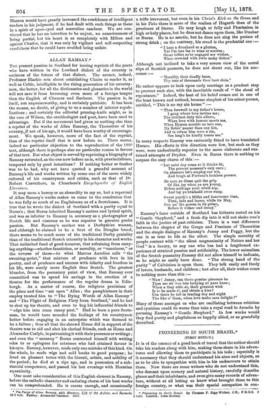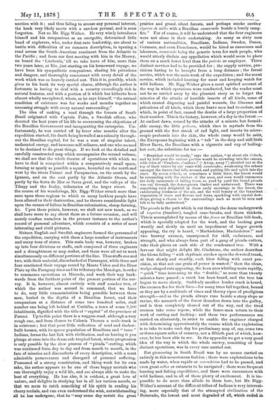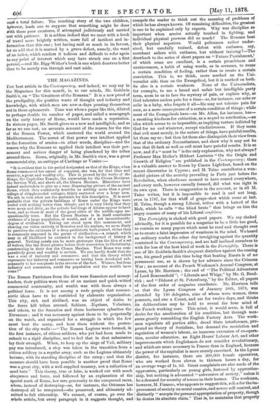PIONEERING IN SOUTH BRAZIL.*
[FIRST NOTICE.]
IT is of the essence of a good book of travel that the author should take his readers along with him, making them share in his adven- tures and allowing them to participate in his toils ; especially is it necessary that they should understand his aims and objects, so as to be able to sympathise with him in his endeavours to attain them. Now there are some writers who do not understand this, who descant upon scenery and natural history, carefully describe places and their inhabitants, and even give many records of adven- ture, without at all letting us know what brought them to this foreign country, or what WOA their special occupation in con- * PiOneering in South Brasil. By Thome P. BIgg-Wither, C.E., F.R.G.S. 2 41 vole. London John Murray.
nection with it ; and thus failing to arouse any personal interest, the book very likely meets with a careless perusal, and is soon forgotten. Not so Mr. Bigg- Wither. He very wisely introduces himself and his companions as an energetic, determined little band of explorers, who, under first-rate leadership, are about to battle with difficulties of no common description, in opening a road across the South-American continent from the Atlantic to the Pacific ; and from our first meeting with him in the Mersey, on board the ' Lusitania,' till we take leave of him, more than two years later, at Rio, just starting on his homeward voyage, we have been his sympathetic companions, sharing his privations and dangers, and thoroughly conversant with every detail of the work which was so bravely carried out. This it is, possibly, which gives to his book its very special charm, although the author is fortunate in having to deal with a country exceedingly rich in natural features, and with a portion of it which has hitherto been almost wholly unexplored, where, as he says himself, "the normal condition of existence was for weeks and months together an unceasing struggle with every natural surrounding."
The idea of making a road through the forests of South Brazil originated with Captain Palm, a Swedish officer, who devoted the best years of his life to overcoming the objections of the Brazilian Government and inaugurating the enterprise. Un- fortunately, he was carried off by fever nine months after the expedition started, his death being bewailed as a calamity through- out the Brazilian capital, for he was a man of singular talent, undaunted energy, and immense self-reliance, and one who seemed to be destined to do great things. If we look at the detailed and carefully constructed map which accompanies the second volume, we shall see that the whole theatre of operations with which we have to deal is comprised within a comparatively small space, forming as nearly as possible a square, bounded on the north and west by the rivers Paranii and Parapanema, on the south by the Iguassu, and on the east partly by the Atlantic Ocean, and partly by the Serra do Mar or Serra geral, and the valleys of the Tibagy and the Ivahy, tributaries of the larger rivers. In the course of his wanderings, Mr. Bigg-Wither struck more than once upon those regions to which so many luckless people have been allured to their destruction, and he throws considerable light upon the causes of failure in Brazilian colonisation, sheep-farming, &c. Upon these points, however, we shall not now touch, as we shall have more to say about them on a future occasion, and will merely confine ourselves in the present instance to the author's record of personal adventure, which consists of a series of most interesting and vivid pictures.
Sixteen English and Swedish engineers formed the personnel of the expedition, carrying with them a large number of instruments and many tons of stores. This main body was, however, broken up into four divisions or staffs, each composed of three engineers and a draughtsman or map-maker, and these were all set to work simultaneously on different portions of the line. Thus staffs one and two, with their material, disembarked at Paranagui, while three and four continued their voyage round by Monte Video and the River Plate up the Paraguay river and its tributary the Mondego, in order to commence operations at Miranda, and work their way back- wards from the furthest point of the present portion of the sur- vey. It is, however, almost entirely with staff number two, of which the author was second in command, that we have to do, very little communication being possible between these men, buried in the depths of a Brazilian forest, and their companions at a distance of some two hundred miles, staff number one being left behind at Curitiba, a town of some 9,500 inhabitants, dignified with the title of " capital" of the province of Parana. Up to this point there is a waggon-road, although a very rough one, and from thence to Colonia Thereza a mule-track is in existence ; but that poor little collection of mud and timber- built houses, with its sparse population of Brazilians and " tame " Indians, forms the last link with civilisation, and on leaving it you plunge at once into the dense sub-tropical forest, where progression is only possible by the slow process of "picada "-cutting, which was continued from day to day and from month to month, in the face of miseries and discomforts of every description, with a most admirable perseverance and disregard of personal suffering. Possessed of a strong constitution, and liking work for its own sake, the author appears to be one of those happy mortals who can thoroughly enjoy a wild life, and are always able to make the best of everything. He has also, it is evident, a great love of nature, and delights in studying her in all her various moods, so that we seem to catch something of his spirit in reading his cheery recitals, and can even understand the wish, notwithstanding all he has undergone, that he "may some day revisit the great prairies and grand, silent forests, and perhaps smoke anotber cigarro de nzilho with a Brazilian camarada beside a lonely camp. fire." For of course, it will be understood that the four engineers were not alone in their undertaking. As many as sixty men of various nationalities, Brazilians, Indians, Swedes, Danes, Germans, and even Frenchmen, would be hired as canoemen and labourers, canzarada being the generic term for such people, who- would utterly disdain any appellation which would seem to place- them on a much lower level than the patrao or employer. Three distinct services had to be provided for ; the supply service, pro- visions having to be brought from a long distance ; the forest service, which was the main work of the expedition; and the scout service, which included hunting for meat and keeping watch for wild Indians. Mr. Bigg-Wither gives a most spirited account of the way in which operations were conducted, but the reader must not be so carried away by the pleasant story as to forget the miseries of the attacks of horrible insects of all kinds, some of which caused disgusting and painful wounds, the illnesses and privations of all kinds, which these brave men had to endure, and which, in point of fact, caused the deaths of a large proportion of their number. This is the history, however, of a day in the forest :— At earliest dawn, roused by the attacks of a minute but formid- able enemy, the little polvora, which rises in myriads from the ground with the first streak of red light, and inserts its micro- scopic proboscis into the skin, the whole camp would be astir, the Europeans beginning with a " tub " in the deep and still little River Barra, the Brazilians with a cigarette and cup of boiling-. hot mate, the substitute for tea Breakfast would be ready," says the author, "at about six o'clock, and by half-past tho various parties would be crowding into the canoes, with cries of S'embora, s'emborar (' Away, away !') shouted out at the top of their voices by our semi-wild cantaradas, awakening the echoes amongst the forest-clad hills around, and putting life and spirit into the start. By seven o'clock, or sometimes a little later, the forest would be resounding with the strokes of the axes, and soon would commence the daily cannonade of falling trees, as yard by yard the broad picada was cut through the dense-grown timber and underwood. There was something very delightful in these early mornings in the forest, the exhilarating freshness of the air, and the wild beauty of the luxuriant . vegetation of trees and flowers and ferns, sparkling with crystal dew- drops, giving a charm to the surroundings such as must be seen and felt to be fully understood."
The picada is the path which is cut through the dense undergrowth of tallith-a (bamboo), tangled cane-breaks, and thorn thickets. This is accomplished by means of the Joann or Brazilian bill-hook, which is specially adapted for the work, and the hacking goes wearily and slowly on until an impediment of larger growth appearing, the cry is beard, " Machadeiros, Machadeiros !" and two brawny axemen, unsurpassed for skill, endurance, and strength, and who always form part of a gang of picada-cutters, take their places on each side of the condemned tree. With a fervour that might delight Mr. Gladstone, the author describes the blows falling "with rhythmic strokes upon the devoted trunk, at first slowly and steadily, each blow falling with exact pre- cision, so that not one grain of power is wasted ;" then the clean, wedge-shaped cuts appearing, the keen axes whirling more rapidly, " quick " time increasing to the "double," as more than twenty minutes have passed ; a crack has been heard, and the tree has begun to move slowly. Suddenly another louder crack is heard, the axemen flee for their lives—for many trees fall together, bound as they are by a multitude of vines and thorny cipos of prodigious strength—and as the picada always runs beside a steep slope or- ravine, the monarch of the forest thunders down into the galley, and is thus completely cleared out of the way, and the tired axemen take some repose, while the foucc-men return to their work of cutting and hacking ; and these two performances are carried on alternately, in order to enable the engineer charged with determining approximately the course which the explokation is to take to make each day his preliminary map of, say, some two or three square miles of country, not a fiftieth part of which, how- ever, he has been able to see. In the appendix we get a very good idea of the way in which the whole survey, consisting of four distinct operations, was in every ease carried out.
But pioneering in South Brazil was by no means carried on entirely in this monotonous fashion ; there were explorations to be made by water, when rapids or corradeiras had to be passed, and even great saltos or cataracts to be navigated ; there were frequent hunting and fishing expeditions, and there were encounters with wild Indians, and in all of these plenty of excitement. It is im- possible to do more than allude to them here, but Mr. Bigg- Wither's account of the different tribes of Indians is very interest- ing, more especially that of the attempted civilisation of the Botocudo, the lowest and most degraded of all, which ended in
su a total failure. The touching story of the two children, wever, leads one to suppose that something might be done 3/4vith these poor creatures, if attempted judiciously and carried -out with patience. It is seldom indeed that we meet with a book of travel more brightly written, more full of incident and in- formation than this one ; but having said so much in its favour, let us add that it is marred by a grave defect, namely, the want of an index, which renders it tedious and difficult to refer again to any point of interest which may have struck one on a first perusal,— and Mr. Bigg-Wither's book is one which deserves better than to be merely run through and cast aside.








































 Previous page
Previous page